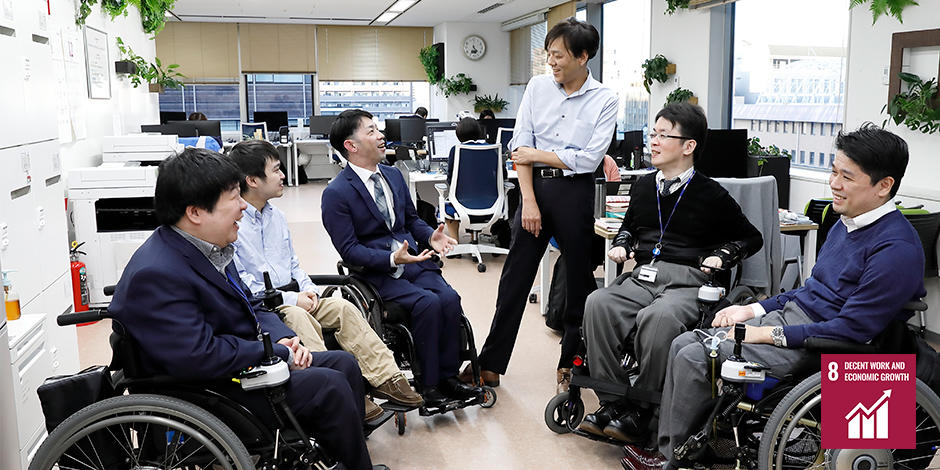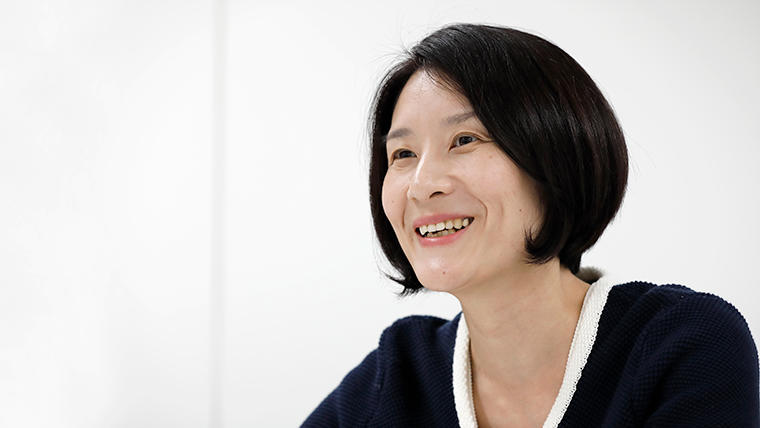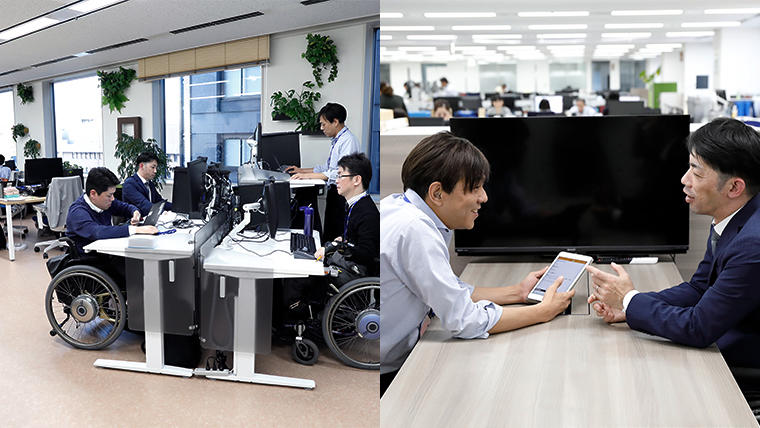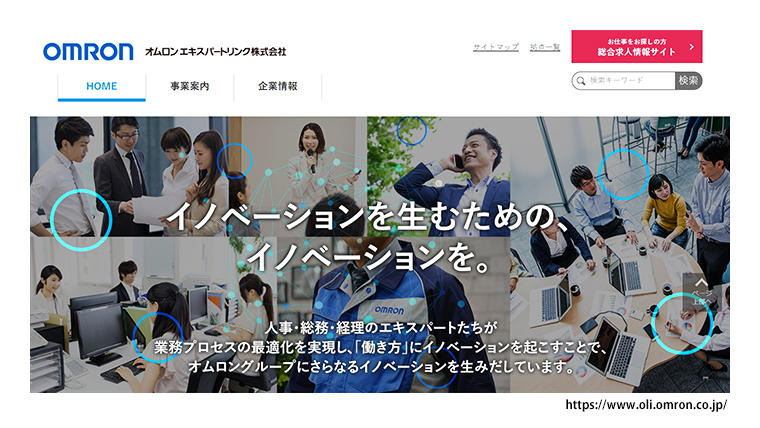
When a diverse base of human resources unites in spirit under the OMRON Principles to take on all challenges, it becomes possible to create innovation driven by social needs through diversity, solving social issues through the company's business. One of the components of the OMRON Principles is Respect for All. Based on this commitment, OMRON engages in recruiting and hiring a diverse base of employees. Hiring employees with disabilities is one part of this engagement, and OMRON is leading the world in its proactive approach to hiring disabled persons. In fact, OMRON has a more than 45-year history in hiring persons with disabilities.
In 1972, OMRON established the first-ever sheltered workshop for disabled persons in Japan as a joint venture with Japan Sun Industries, an organization engaged in encouraging the disabled to become independent. The new company was called OMRON TAIYO Co., Ltd. In 1985, OMRON established OMRON Kyoto Taiyo. Since that time, the company has been active in creating opportunities for the disabled to contribute and thrive, using the company's business to create a society offering abundant opportunities for disabled persons to experience the joy and satisfaction of work.
Presently, the OMRON Group employs disabled persons not only through special subsidiary companies OMRON Taiyo and OMRON Kyoto Taiyo, but also in every department and division throughout the group, including sales, human resources, administration, legal, and development. One feature of OMRON's efforts is that, beyond merely offering a social contribution, the company is serious in improving profitability through hiring persons with disabilities. To this end, OMRON strives to create environments and initiatives that support disabled persons in making the most of their individuality and skills.
 Hiroe Matsunaga, Diversity Promotion Department, Challenged Promotion Division, OMRON EXPERTLINK Co., Ltd.
Hiroe Matsunaga, Diversity Promotion Department, Challenged Promotion Division, OMRON EXPERTLINK Co., Ltd.Hiroe Matsunaga is responsible for creating work environments within the OMRON Group for persons with disabilities. Says Matsunaga, "What we feel is important is engaging in initiatives and creating environments in which persons with special needs can deliver results by leveraging their personalities and skills. This is a vital strategy for a company that treats disabled persons in the same manner as the non-disabled. Every person's need for support differs according to the degree of disability. It's important that we at the Challenged Promotion Department work with disabled employees and their superiors to determine what true support is required. To achieve this requires a deep mutual understanding between the company, superiors, co-workers, and employees with disabilities.
To deepen this understanding at OMRON, employees with special needs meet with their superior once annually in one-on-one interviews. The employee has the opportunity to discuss their daily challenges in work and their working environment, including safety considerations during disasters. This meeting is also an opportunity for the employee to talk about their aspirations with their boss. OMRON has seen numerous examples of changes stemming from these opportunities to deepen mutual understanding.
OMRON also conducts programs to encourage understanding of persons with disabilities. These programs include universal manner training, barrier-free training, visual impairment experiences, and other trainings on a regular basis.
Says Matsunaga, "Regardless of disability, it is important for people to support each other naturally, growing together and creating a workplace in which every person can express themselves, regardless of disability. We must believe in the possibilities of every person, leveraging one's own strengths to support those around. By understanding and supporting each other, we can all work better and create rising levels of performance as a company."
 |
|
| Employees Can Adjust Desks to Their Preferred Height | Using UD Talk for Smooth Communications |
As Matsunaga and her co-workers engage in creating the best corporate environment, OMRON boasts several departments in which employees with disabilities play a central role in providing effective back-office contributions. Takeshi Yamamoto, who has a lower-body disability, leads a web-development team. This team consist of seven individuals with disabilities who support website design, production, and systems development for the OMRON Group's Japanese sites. To date, the group has provided work for the OMRON handball team website and the OMRON EXPERTLINK corporate recruitment website.
Each of the team's seven members have different disabilities, from lower- or upper-body challenges to hearing impairment. Certain of the team members face difficulties in traveling to work on a daily basis. These persons not only enjoy the use of OMRON's work-friendly environment and systems, but they also work to provide their own value in turn.
Says Yamamoto, "While very common today, our team was one of the very first to offer telecommuting and other flexible work arrangements. We utilize technology and other means to allow our members to perform their work. Of course, we create overall team plans and plans for each individual, conducting detailed progress management. We also respond to contingencies if someone can't come into work suddenly. For example, we take inventory of web production tasks, breaking everything down to the action level. We always assign pairs to be responsible for these detailed tasks. Since we're a team that offers flexible work styles for each individual, we actually emphasize teamwork, since we do not see each other in person on a daily basis. We have a rule that every team member comes in to the office on Wednesdays. We use these days to share overall team progress and follow up on any work-related challenges."
Yamamoto further said, "In 2018, we established new quantitative goals and launched an initiative to provide better visibility for our progress and performance. By setting goals, we can make proposals to other departments and group companies, rather than simply waiting for a request. This leads to a more active approach in going out and finding work. I think this new method has made every team member more confident and more positive in their work."
 Takeshi Yamamoto, Challenged Promotion Division, Web Develop Team, OMRON EXPERTLINK Co., Ltd.
Takeshi Yamamoto, Challenged Promotion Division, Web Develop Team, OMRON EXPERTLINK Co., Ltd.
With this new confidence, team members have leveraged their own abilities and experience to a wider range of fields.
"We began a new initiative for improving website accessibility* because we wanted to reach more people to let them know information about the OMRON Group who is providing a friendly working environment for persons with disabilities." says Yamamoto.
This initiative, which began with very nebulous parameters, led to at least one notable result. In July 2019, the OMRON EXPERTLINK corporate website developed by Yamamoto and his team was awarded Level AA under the web accessibility guidelines of Japanese Industrial Standards; JIS X8341-3:2016.*.
"Being one of the few AA websites in Japan became a major source of confidence for our team. By implementing these concepts on other OMRON websites, we hope to show how to make a website more accessible by putting our experience as disabilities to use." said Yamamoto, passionately.
 The OMRON EXPERTLINK Co., Ltd. Website Received Level AA Under JIS X8341-3:2016
The OMRON EXPERTLINK Co., Ltd. Website Received Level AA Under JIS X8341-3:2016* Web accessibility: Website design allowing visually or hearing-impaired
individuals to easily access website content via PC or smartphone.
* JIS X8341-3:2016: Guidelines for older persons and persons with disabilities
- Information and communications equipment,
software and services - Part 3: Web content
OMRON has launched a new initiative to expand opportunities to work and contribute to persons with disabilities. This new initiative involves an area of employment not widely practiced in Japan--hiring persons with mental disabilities, including persons with developmental disabilities.
Norimasa Fujii is in charge of promoting the hiring of mentally challenged individuals at OMRON. Says Fujii, "Japanese society in general hires more persons with special physical needs every year. In 2018, that number surpassed 500,000 individuals. In contrast, only 3.5 percent of the 2 million mentally disabled persons in Japan (including developmental disabilities)* have been hired at private companies. We believe that the very act of hiring persons with mental disabilities leads to the type of social solutions that OMRON strives to achieve. At the same time, Japan's working population is shrinking. Our efforts to become a company that embraces diverse individuals will also contribute to strengthening society. These are the thoughts behind our efforts to hire persons with mental disabilities."
* 25 to 65 years old
 Norimasa Fujii, Diversity Promotion Department, Challenged Promotion Division,
Norimasa Fujii, Diversity Promotion Department, Challenged Promotion Division, In contrast to hiring persons with physical disabilities, OMRON does not have deep experience hiring mentally disabled persons. Accordingly, the company partnered with an organization nationally certified to provide employment support for mentally disabled persons, receiving recruiting services and advice. OMRON employs these individuals in administrative and software engineering jobs. OMRON has learned that, in certain situations, persons with developmental disabilities can perform repetitive tasks at higher levels than non-disabled employees.
Prior to being hired, mentally disabled persons undergo one month of hands-on training. After a period of assessment, both on the part of the employing department and the individual themselves, new employees report for duty. Here, as well, the nature and extent of the disability necessitates certain considerations. These include providing clear instructions and even assigning a job coach to support the individual in their job.
Some employees are unsure initially about how to interact with their mentally disabled co-workers. Norimasa Fujii's advice to one such employee was, "Be considerate, but don't be overly reserved...Ask the person directly if you don't know how you should act. You can only offer the appropriate consideration once you understand more about the other person." The employee accepted the advice, and a stronger relationship formed between the co-workers over time.
Fujii also said that the stable, long-term ongoing contribution of employees with mental disabilities will mainly require the understanding of co-workers, as well as the united support of family and attending physicians.
Says Fujii, "It's important for the individual themselves to understand their own situation and to have the desire to be responsible in completing their work assignments. For example, some mentally disabled persons can tend to focus excessively. These individuals need to be aware of the nature of their disability and take regular breaks. They need to be able to exercise enough self-control to ask for help in order to accomplish their responsibility for the tasks given them. As long as there is consideration in the workplace, self-awareness, and desire, then I don't see any limits to the field or type of work an individual with disabilities can perform."
OMRON is still in the very early stages of taking on new challenges in creating opportunities and expanding approaches for persons with disabilities to contribute.
![]()